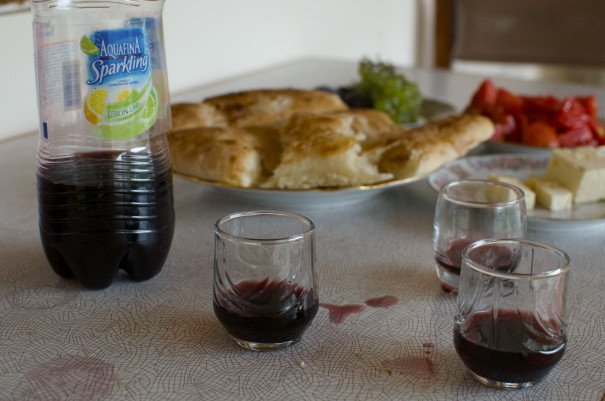
Come for the Second‑Best Water in the World, Stay for the Wine

Come for the Second‑Best Water in the World, Stay for the Wine
Pomegranate Wine in Dilijan
I first hear about pomegranate wine in a village at the edge of the Iranian desert in the height of summer. The settlement, composed of mud-brick houses slowly collapsing into the dust, is fringed by a burst of green: a lush public garden, watered by underground canals, laden with as-yet-unripe pomegranates. “When they ripen, we send most for export,” my host says as we wander in the shade, “the rest we use to make pomegranate wine.” I rue my timing, months before this year’s illicit winemaking can begin, and give pomegranate wine up for lost, only to stumble upon it months later and a world away, in the mist-enveloped Armenian highlands.
Dilijan is hardly what one might expect from a resort town. Perched on verdant mountain slopes and renowned for the quality of its water (“the second best in the world,” as a line from an old movie has it), the village is damp and somewhat mildewed and very small. A visitor walking in the direction of the town center could be forgiven for striding right on by. There’s a traffic circle, and a small café. On a gentle rise nearby perches a modernist monument—all brutalist spikes and flat slabs of concrete—which, in lieu of any explanation, is presumably intended to commemorate the Armenian genocide.
With the light fading fast, a thin drizzle persisting, and no means of transport, there is nothing much to do but sample the (disappointing) local water from decorative drinking fountains and make appreciative noises. The night stretches out ahead of us. We—a rag-tag band thrown together by chance, including a Georgian (handy for his Russian conversation skills), and a Turk (whom we introduce as being “from Istanbul,” to avoid mentioning his nationality)—promptly decide to acquire something little stronger. A wine-oriented wander begins.
There is wine everywhere in Armenia. Perhaps you wouldn’t notice if you hadn’t arrived straight from a country where alcohol is at best invisible and at worst unavailable. But I had, and I did. As mellow Yerevan evenings lengthen languidly into night, women with crisp bobs and pretty sundresses saunter the sidewalks, past convivial tables of revelers spilling out onto the streets. Dark figures stumble home in ragged zigzags. Armenia boasts some of the earliest remnants of winemaking in the world: ancient grape residues clinging to fragments of pottery, detected by the presence of red pigment, indicate that the country has seemingly been getting drunk on the good stuff since at least 4000 BCE, although some scholars point out that the residual red could have been left by pomegranates.
Ah, the pomegranate! To a Classics scholar, the fruit is steeped in sex and knowledge and power and myth, situated at the interstices of life and death; between this world and another; the old and the new. A liminal, unstable signifier, the fruit is both gift and threat, promise and challenge. Crushed and fermented and bottled blood-red it becomes even more enchanted: a magical potion, an exotic object, a doorway into elsewhere.
Such poetic notions elude us in Dilijan. It’s raining. We’re bored. A tipple is called for. And we find it in a scuffed, stuffed grocery store tucked in next to a closing-up open-air market. In the musty interior, an elderly man and woman survey an aisle or two of commercial packaged cakes, pickles, and spices. I am dispiritedly surveying a dusty rack of unappetizing wine bottles, when the Georgian hails me over to a small glass case boasting crumbling homemade cheese amidst plastic bottles of inky crimson liquid. “This is what we’re looking for,” he says, eyes sparkling, as the proprietress nods sagely. “Noor,” she says. “Very special.”
If, to me, pomegranate is an exotic symbol of elsewhere—of myth and legend, Persephone and Demeter, Scheherazade and the Shahnameh—to Armenians, the fruit is a potent marker of home. Pomegranates saturate the country’s culture and history, cropping up in stone-carvings, architectural details, tapestries, manuscripts. Yerevan souvenir shops and markets are cluttered with pomegranate paraphernalia, while Armenian wedding venues used to literally drip with the fruit: brides traditionally flung a pomegranate against the wall, the ensuing splatter of seeds ensuring the union’s fertility. Such faith in the fruit’s fecundity contrasts starkly with ancient Greece’s reliance on pomegranate as a contraceptive; the fruit’s contrary nature—life/death, beginning/end, power/impotence—strikes again.
We buy a liter and lug the precious liquid home in a plastic bottle that previously contained some kind of soda, drinking incarnadine tumblers of the stuff alongside bread and salty white cheese, grapes, tomatoes, plums. Later, in Istanbul, my Turkish host is given a gift of pomegranate wine by an Armenian friend: a beautiful grenade-shaped glass bottle, bloated, wax-covered belly splitting in the centre to reveal knobbled glasswork seeds and the red gleam of liquor. She is instructed, Persephone-like, not to touch it, for luck.
In Dilijan, no such superstitions constrain us; we are travelers—outside of tradition, existing in our own in-between other-where—and our homemade concoction, encased in plastic, invites not reverence but revelry. Sweet-sour, rich, full-bodied, the wine is surprisingly strong, especially after two months of Iran-induced abstinence. Looking out over the darkening mountains from our chilly guesthouse balcony, we talk until late into the night, lips stained a deepening purple with each sip.